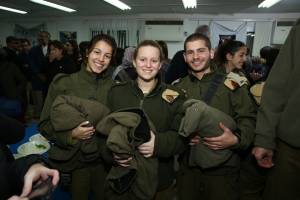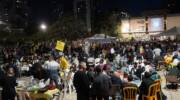Should Nour Madhoun even be considered a Palestinian refugee? In Lebanon, she is – and here’s why it matters.
By Pesach Benson, United With Israel
Meet Nour Madhoun, a 28-year-old woman of Palestinian-Lebanese descent working as a nurse at The Wellington Hospital in St John’s Wood, in northern London.
She was profiled on Friday by MyLondon, a London community news site, and her successes and challenges raise a lot of questions about Palestinian refugees.
Nour’s father is a Palestinian whose family fled to Lebanon in 1948. It’s implied, but not directly stated, that her father was born in what would become the State of Israel. Nour’s mother is a Lebanese citizen.
By most other standards, Madhoun ought to inherit her mother’s Lebanese citizenship, and that would be the end of the story. But when it comes to Lebanon’s treatment of Palestinian refugees, nothing is simple.
First of all, by Lebanese law, citizenship is passed on to children only from the father. If only the mother is Lebanese, the children cannot even own or inherit property. The children are also considered foreigners, limiting their access to education, health care and employment.
Second of all, efforts to reform Lebanon’s 91-year-old nationality laws have been stymied because political leaders fear that any change would lead to a flood of male Palestinian or Syrian refugee men marrying Lebanese women and never leaving the country, according to a 2016 Reuters report. The political echelon pointed to the country’s “delicate” demographic balance of Christians, Sunnis, Shi’ite and Druze.
“I always wanted to become a doctor, but it’s not allowed under Lebanese law to be enrolled,” Nour told MyLondon. “Even if I got my master’s, I can’t become a doctor. It’s only for the Lebanese people. Once they know I am a refugee, they will make excuses not to hire me.”
With her aspirations closed off by Lebanese law, Nour instead became a nurse and worked in private hospitals for five years. But the psychological stress of simultaneously caring for 10 patients along with Lebanon’s spiraling inflation and shortages of electricity, food and medicine took their toll. The massive Beirut port explosion of 2020 was when Nour decided she had enough.
She applied to Talent Beyond Boundaries, a U.S.-based international non-profit organization that matches professionally skilled refugees with organizations looking to fill needs. Nour and several other displaced health care workers were recruited into staff nurse roles in London.
According to MyLondon, Nour and her husband have been set up for accommodation, food vouchers and other support. They have a three-year permit to stay in Britain, and Nour is studying for an exam that would make her a fully licensed nurse. She is even considering pursuing a master’s degree afterwards, an option not available to Lebanon’s 210,000 Palestinian refugees or 1.5 million Syrian refugees.
According to the UN Relief and Works Agency, which is responsible for supporting Palestinian refugees, there are seven million Palestinian refugees worldwide. But UNRWA critics point out that this is an inflated number because its definition of refugees is out of step with the UN High Commissioner for Refugees’ definition. The UNHCR cares for more than 26 million refugees worldwide.
Under UNHCR’s more widely accepted definition, refugee status is not automatically passed down to descendants. By UNHCR standards, the true number Palestinian refugees is 30,000.
While the UNHCR has succeeded in getting millions of refugees resettled and absorbed in new countries, the Arab states deliberately took measures to prevent Palestinian refugees from being absorbed in Lebanon, Jordan and Syria because they hold out hope of eventually flooding Israel with Palestinians under the so-called but non-existent “Right of Return.”
Israel opposes the return of Palestinian refugees. Officials point out that Israel has already absorbed — with little to no international assistance — more than 800,000 Jewish refugees from Arab countries, which would amount to a population exchange.
The international community mostly ignores the inequality faced by Palestinian refugees and their descendants in Lebanon, focusing instead on the alleged injustices in Israel.
How ironic: Had Madhoun’s father remained in Israel, Nour would have been an Israeli citizen with full access to the country’s education, health care and employment. It’s even conceivable she’d be Dr. Nour Madhoun.
Bring Joy to Israeli Soldiers - Send Winter Care Packages!
We are honored to thank the young men and women of the IDF who risk their lives every day to defend the citizens of Israel.
Join us in sending winter care packages and personal notes of support to Israeli soldiers who are out in the cold all day.
Warm up a soldier's heart with essential winter wear including fleece jackets, hats, gloves and more. Keep an entire unit warm!
THE SOLDIERS REALLY APPRECIATE YOUR LOVE AND CONCERN!
Click Here to Send Your Gift and Personal Note to Israeli Soldiers
Do You Love Israel? Make a Donation - Show Your Support!
Donate to vital charities that help protect Israeli citizens and inspire millions around the world to support Israel too!
Now more than ever, Israel needs your help to fight and win the war -- including on the battlefield of public opinion.
Antisemitism, anti-Israel bias and boycotts are out of control. Israel's enemies are inciting terror and violence against innocent Israelis and Jews around the world. Help us fight back!
























